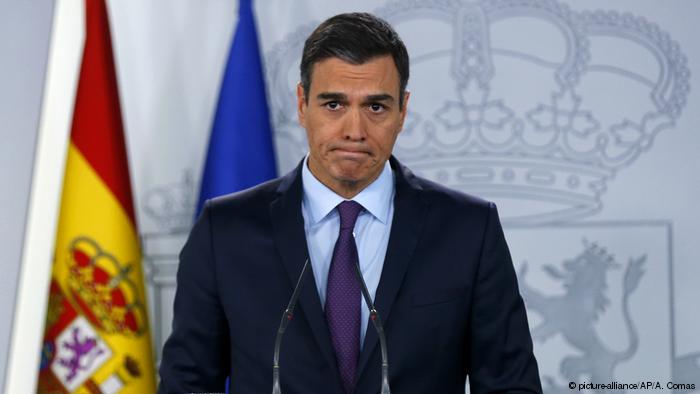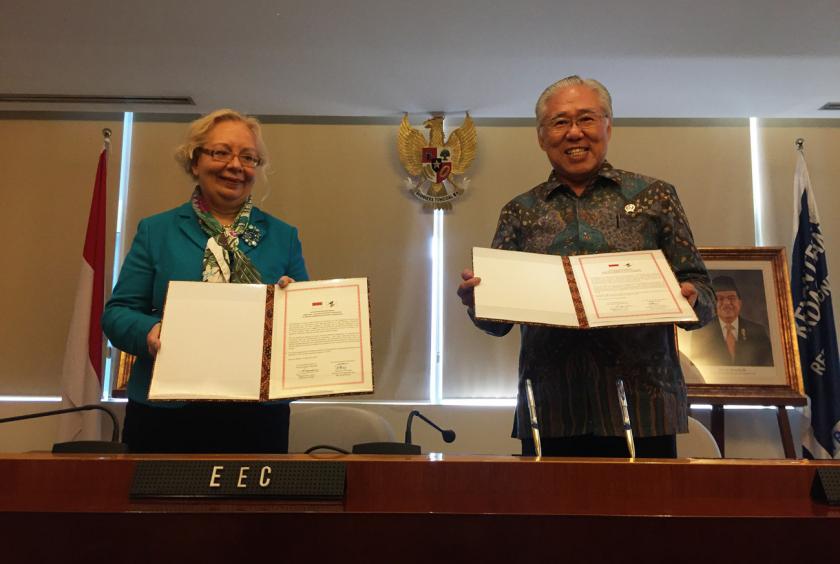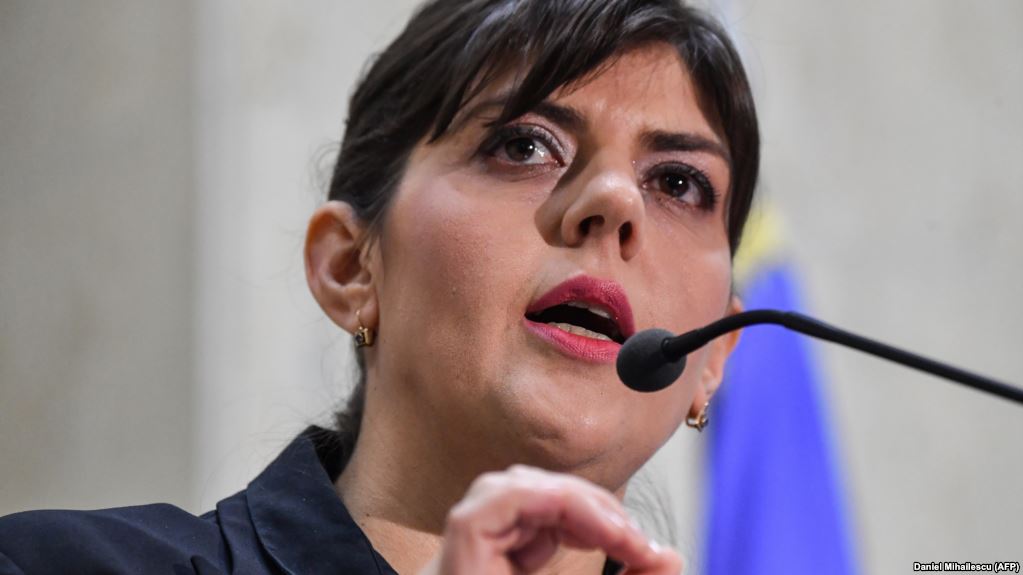EurActiv (15 February 2019)
Facebook Inc said on Thursday (14 February) it had disrupted an attempt to influence voters in Moldova, increasing concerns that EU elections in May could be prey to malign activity.
Employees of the Moldovan government were linked to some of the activity, the California-based social media company said.
Authorities in Chisnau, capital of the tiny former Soviet republic, denied knowledge.
Facebook said it dismantled scores of pages and accounts designed to look like independent opinion pages and to impersonate a local fact-checking organisation ahead of Moldova’s elections later this month.
“So they created this feedback loop,” Nathaniel Gleicher, Facebook’s head of cybersecurity policy, told reporters in Brussels. “We did assess that there were links between some of that activity and individuals associated with the Moldovan government.”
The government said it welcomed any initiative to combat “fake news”, saying it did not check the private accounts of its more than 200,000 state employees.
“They have different political views and opinions, and the state is obliged to maintain the boundary between fighting the phenomenon of Fake News and guaranteeing the freedom of expression for citizens,” it said.
Facebook said it removed 168 accounts, 28 pages and eight Instagram accounts involved in “inauthentic behaviour”. Some 54,000 accounts followed at least one of these Facebook pages.
The owners of pages and accounts typically posted about local news and political issues such as requirements for Russian- or English-language education and potential reunification with Romania, the company said.
Guarding elections
Facebook stepped up efforts to combat disinformation, including accounts in Russia, Iran and Indonesia, over the last year after coming under public scrutiny for not doing enough to stem the spread extremism and propaganda online.
The vulnerabilities exposed in Moldova, sandwiched between EU members Romania and Ukraine on the fringes of the bloc, were a warning ahead of polls in neighbouring Ukraine and for the European legislature.
The European Union has pushed tech companies to do more to stop what it fears are Russian attempts to undermine Western democracies with disinformation campaigns that sow division.
Russia has repeatedly denied any such actions.
EU Commission takes aim at disinformation, admits funding deficit
A four-strong contingency of European Commissioners came out with fighting talk against fake news on Wednesday (5 December), as the EU’s executive presented its action plan on disinformation. But the funding shortfall in this field somewhat dampened the spirit of the announcement.
The sheer perception of manipulation can damage polls, Gleicher warned. “We are starting to see actors try to create the impression that there is manipulation without owning lots and lots of accounts,” he said.
“We already have the teams up and running and focused on the European parliamentary elections and that is only going to grow as the elections get closer and the pace of threats increases.”
Dogged by scandal, Moldova’s pro-Western government has failed to lift low living standards. That has driven many voters towards the Socialists, who favour closer ties with Russia.
The European Parliament called Moldova a “state captured by oligarchic interests” in November, and there are concerns whether the parliamentary election on February 24 will be fair.
The election is likely to produce a hung parliament, which could set the scene for months of wrangling or possibly further elections.
EXCLUSIVE / In a wide-ranging interview, the minister of foreign affairs and European integration of Moldova, Tudor Ulianovschi, talks about his country’s relations with the EU and Moscow, the political situation ahead of crucial elections, and the prospects for frozen conflicts in Transnistria as well as other issues.
No comments yet.
-
 SPAIN: WILL A SNAP ELECTION SPELL THE END FOR PEDRO SANCHEZ?
Europe - EU
15.02.2019
SPAIN: WILL A SNAP ELECTION SPELL THE END FOR PEDRO SANCHEZ?
Europe - EU
15.02.2019
- FRENCH PRESIDENT TO PAY STATE VISIT TO ARMENIA The Caucasus and Turkish-Armenian Relations 15.02.2019
- GHADHBAN RESHUFFLES OIL MINISTRY LEADERSHIP TEAM Iraq 15.02.2019
-
 INDONESIA TO COOPERATE WITH FIVE EURASIAN COUNTRIES IN TRADE
Asia - Pacific
15.02.2019
INDONESIA TO COOPERATE WITH FIVE EURASIAN COUNTRIES IN TRADE
Asia - Pacific
15.02.2019
-
 FRONT-RUNNER FOR EU PROSECUTOR'S POST FACES INVESTIGATIVE HEARING AT HOME IN ROMANIA
The Balkans
15.02.2019
FRONT-RUNNER FOR EU PROSECUTOR'S POST FACES INVESTIGATIVE HEARING AT HOME IN ROMANIA
The Balkans
15.02.2019
-
25.01.2016
THE ARMENIAN QUESTION - BASIC KNOWLEDGE AND DOCUMENTATION -
12.06.2024
THE TRUTH WILL OUT -
27.03.2023
RADİKAL ERMENİ UNSURLARCA GERÇEKLEŞTİRİLEN MEZALİMLER VE VANDALİZM -
17.03.2023
PATRIOTISM PERVERTED -
23.02.2023
MEN ARE LIKE THAT -
03.02.2023
BAKÜ-TİFLİS-CEYHAN BORU HATTININ YAŞANAN TARİHİ -
16.12.2022
INTERNATIONAL SCHOLARS ON THE EVENTS OF 1915 -
07.12.2022
FAKE PHOTOS AND THE ARMENIAN PROPAGANDA -
07.12.2022
ERMENİ PROPAGANDASI VE SAHTE RESİMLER -
01.01.2022
A Letter From Japan - Strategically Mum: The Silence of the Armenians -
01.01.2022
Japonya'dan Bir Mektup - Stratejik Suskunluk: Ermenilerin Sessizliği -
03.06.2020
Anastas Mikoyan: Confessions of an Armenian Bolshevik -
08.04.2020
Sovyet Sonrası Ukrayna’da Devlet, Toplum ve Siyaset - Değişen Dinamikler, Dönüşen Kimlikler -
12.06.2018
Ermeni Sorunuyla İlgili İngiliz Belgeleri (1912-1923) - British Documents on Armenian Question (1912-1923) -
02.12.2016
Turkish-Russian Academics: A Historical Study on the Caucasus -
01.07.2016
Gürcistan'daki Müslüman Topluluklar: Azınlık Hakları, Kimlik, Siyaset -
10.03.2016
Armenian Diaspora: Diaspora, State and the Imagination of the Republic of Armenia -
24.01.2016
ERMENİ SORUNU - TEMEL BİLGİ VE BELGELER (2. BASKI)
-
AVİM Conference Hall 24.01.2023
CONFERENCE TITLED “HUNGARY’S PERSPECTIVES ON THE TURKIC WORLD"









